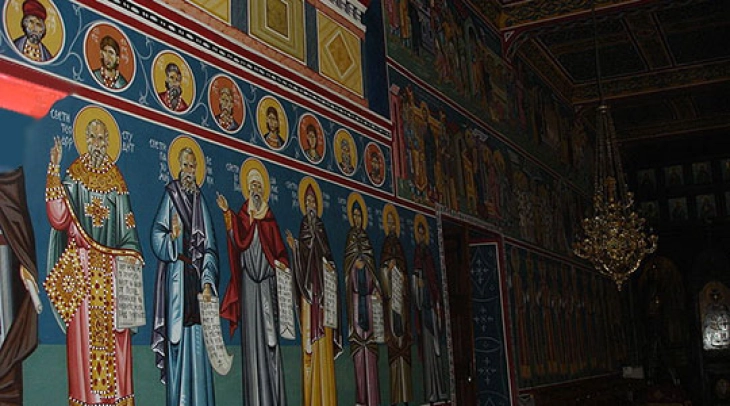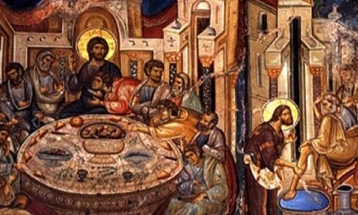
21 December 2024 (MIA)
Macedonian Orthodox Church Calendar
St. Patapius
Born and brought up in the Faith and in the fear of God by pious parents in the Egyptian city of Thebes, he early perceived and rejected the empty vanity of the world and went into the Egyptian desert, where he devoted himself to cleansing his heart from every worldly thought and desire for the sake of divine love. When his virtues became known among the people, they began to come to him and seek relief from their troubles. Afraid of human glory, which darkens a man’s mind and separates it from God, Patapius fled from the desert to Constantinople, for this wonderful saint thought that he could more easily hide himself from men in the heart of a city than in the desert. He built himself a hut close to the Blachernae church and there, enclosed and unknown, took up again his interrupted life of asceticism. But the light cannot be hidden. A child, blind from birth, was led by divine Providence to St Patapius and begged him to offer a prayer that he might be given his sight and look upon God’s creation, and praise God all the more. Patapius had pity on the suffering child and prayed to God, and the child saw. Through this miracle, Patapius’s godly life became known throughout the entire capital, and people began to turn to him for healing, comfort and teaching. Patapius healed one eminent man of dropsy after blessing him with a cross and anointing him with oil. Making the sign of the Cross in the air, he freed a youth from an unclean spirit which had cruelly tormented him, and the evil spirit went out of God’s creature like smoke, uttering a great cry. He made the sign of the Cross over a woman who had sores on her breasts all filled with worms, and she was healed. St Patapius worked many other miracles, all through prayer in the name of Christ and by the power of the Cross. He entered into rest in great old age, going to the Kingdom of God in the seventh century.
Catholic Calendar
St. Peter Canisius
In 1565, the Vatican was looking for a secret agent. It was shortly after the Council of Trent and the pope wanted to get the decrees of the Council to all the European bishops. What would be a simple errand in our day, was a dangerous assignment in the sixteenth century. The first envoy who tried to carry the decrees through territory of hostile Protestants and vicious thieves was robbed of the precious documents. Rome needed someone courageous but also someone above suspicion. They chose Peter Canisius. At 43 he was a well-known Jesuit who had founded colleges that even Protestants respected. They gave him a cover as official “visitor” of Jesuit foundations. But Peter couldn’t hide the decrees like our modern fictional spies with their microfilmed messages in collar buttons or cans of shaving cream. Peter traveled from Rome and crisscrossed Germany successfully loaded down with the Tridentine tomes – 250 pages each -not to mention the three sacks of books he took along for his own university! Born in Holland in 1521, Peter had edited and written several volumes on Church history and theology, been a delegate to the Council of Trent, and reformed the German universities from heresy. Called to Vienna to reform their university, he couldn’t win the people with preaching or fancy words spoken in his German accent. He won their hearts by ministering to the sick and dying during a plague. The people, the king, and the pope all wanted to make Peter bishop of Vienna, but Peter declined vigorously and administered the diocese for a year. Peter died in December 21, 1597. He is known as the Second Apostle of Germany and was named a Doctor of the Church.







